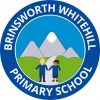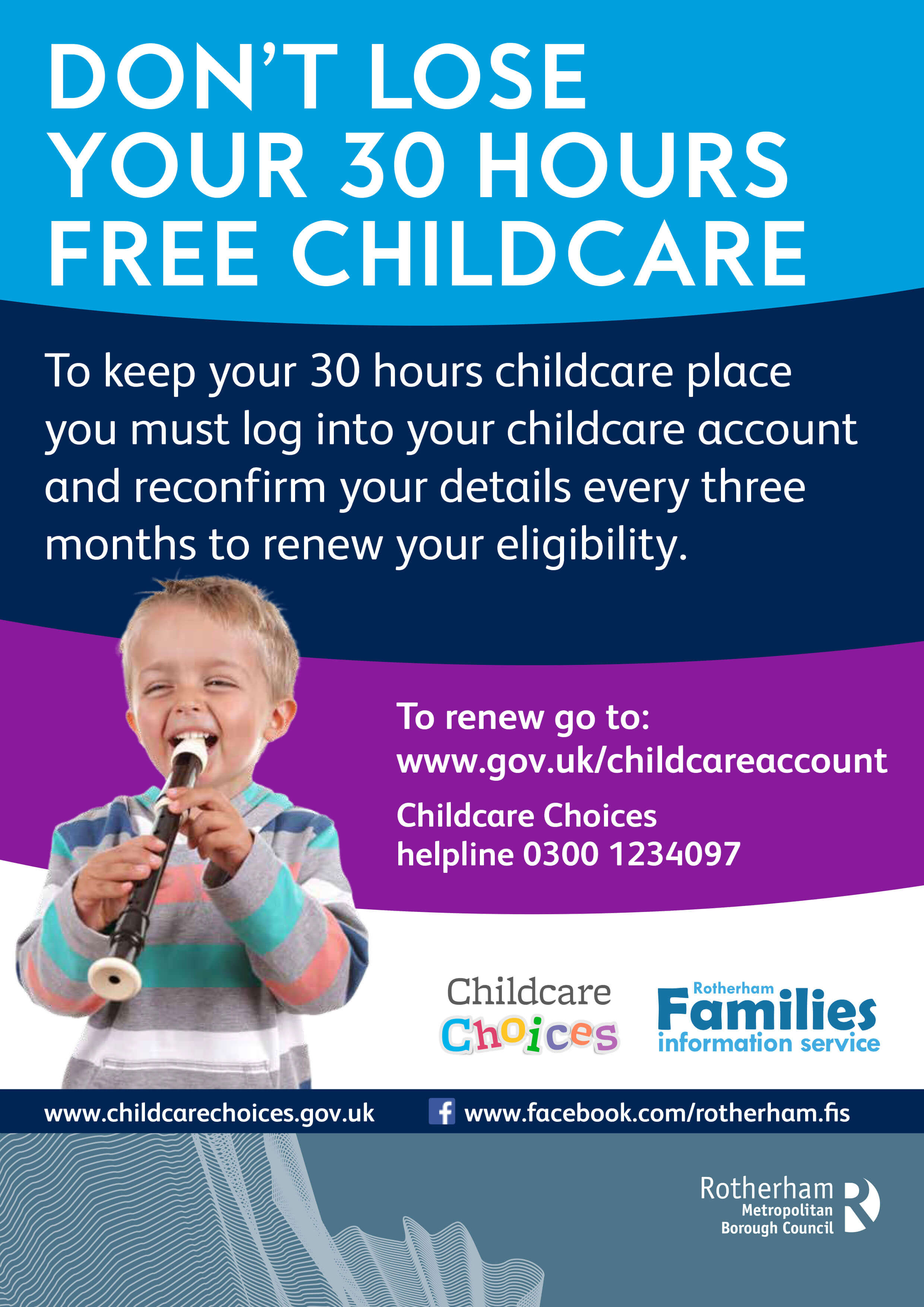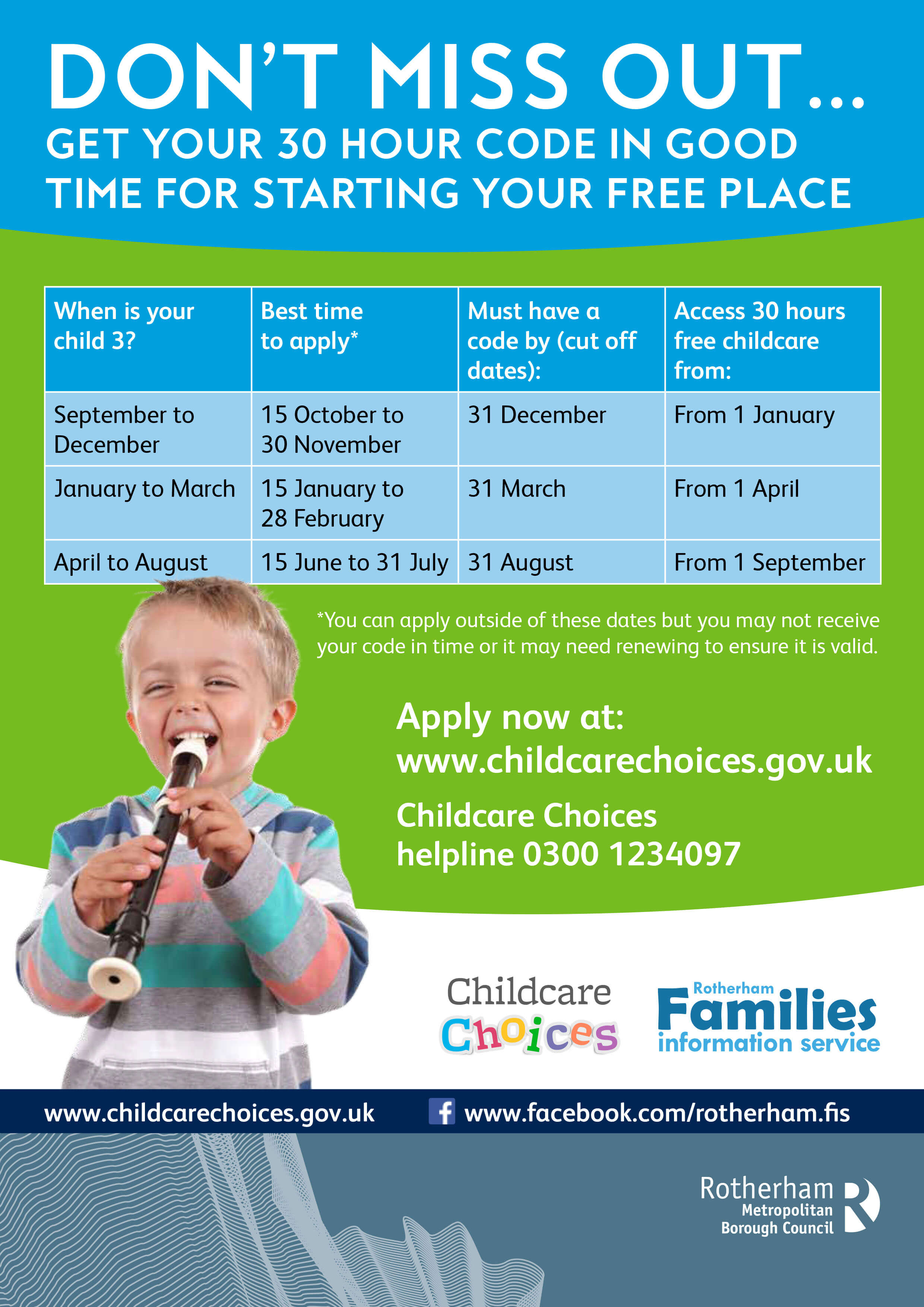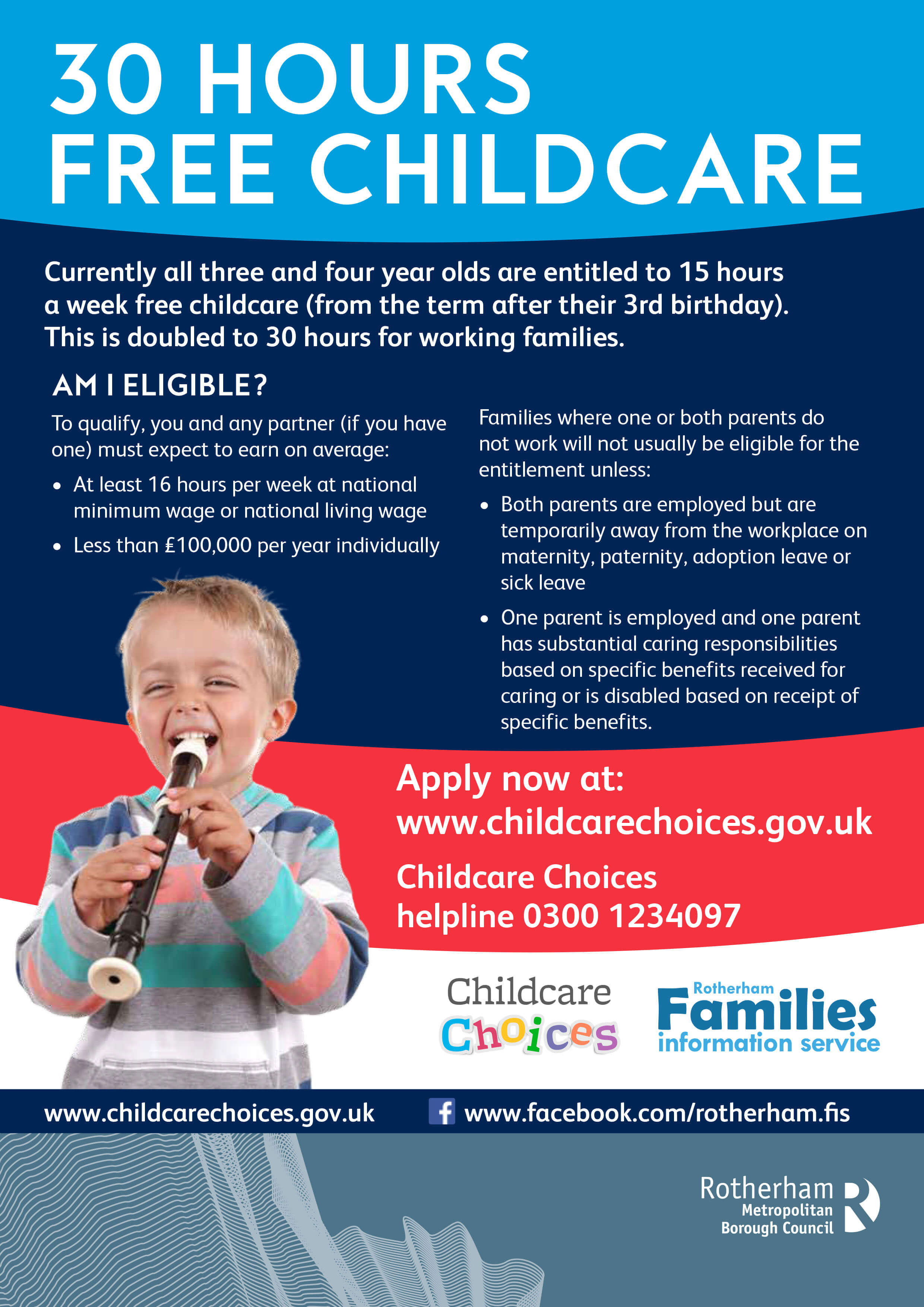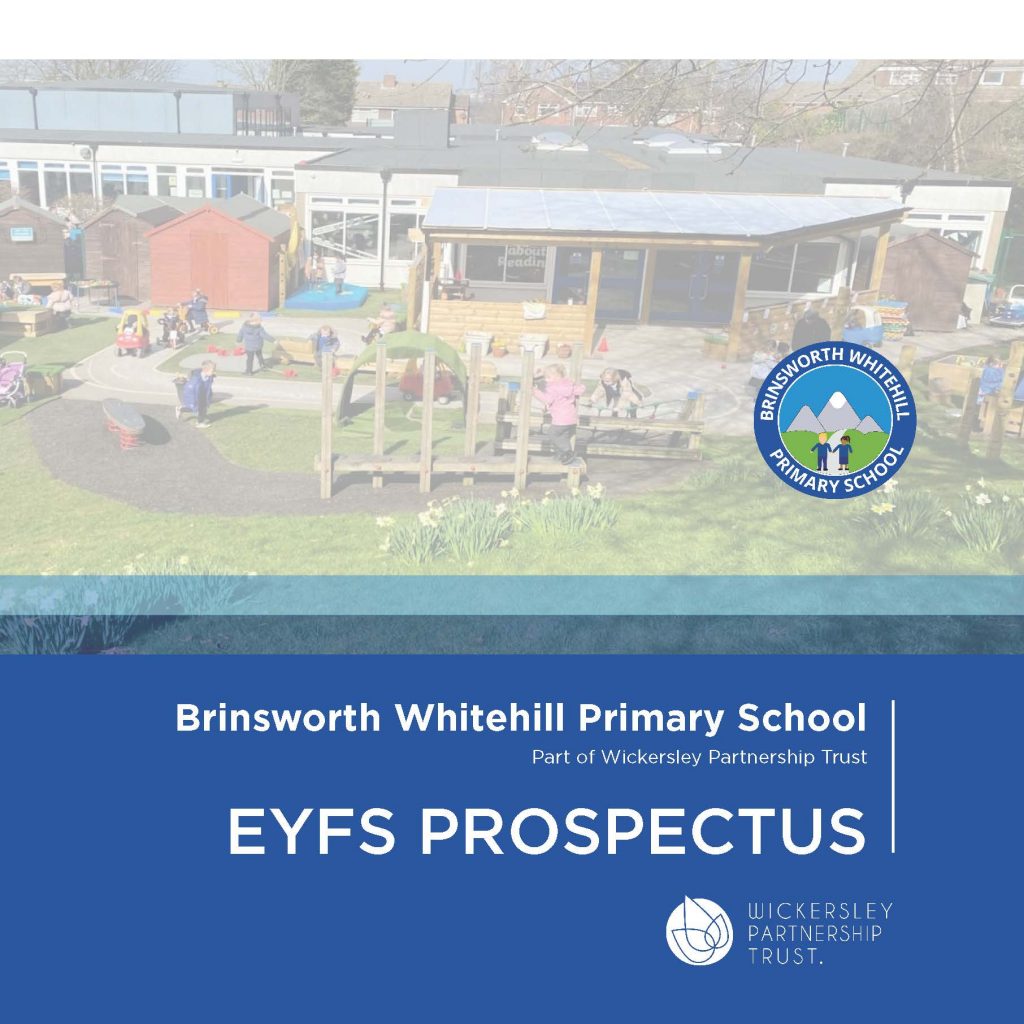Foundation STage
In our Early Years Foundation Stage, we aim to create:
- A safe, stimulating, positive and happy environment in which our children
can develop socially, emotionally, intellectually and physically to reach
their full potential. - An atmosphere that encourages everyone to value others regardless of
ability, race, gender and creed. - Opportunities that will enable the children to work with increasing
independence.
Revised FS1 costings from January 2026
- Cost per session (morning or afternoon) £13
- Additional cost for a 30 hour child who is staying all week £10
- Child staying for lunch – no additional cost
Our Curriculum
Here at Brinsworth Whitehill Primary school we have planned and developed an ambitious curriculum that ensures children can shape their learning over time. We believe that by instilling a love of learning children will leave Foundation Stage with a positive attitude to school life and beyond. In Foundation Stage, children are able to develop their skills and build up their knowledge in addition to becoming confident, resilient and independent learners.
Our curriculum at Brinsworth Whitehill has been designed to recognise children’s prior learning, both from previous settings and through their experiences at home. We work in partnership with parents and carers to ensure children can develop to reach their full potential from their various starting points.
Our curriculum supports children’s development in all 7 areas of learning.
The Prime Areas
Communication & Language
Personal, Social & Emotional Development
Physical Development
The Specific Areas
Literacy
Maths
Understanding the World
Expressive Arts and Design
Through these 7 areas of learning it is our fundamental aim that all children develop physically, verbally, cognitively and emotionally in an environment which values all cultures, communities and people.
We understand that play is an integral part of learning and this is at the heart of our Early Years curriculum. We believe that the correct mix of adult directed and uninterrupted child-initiated play ensures the best outcomes for pupils.
Implementation
Through these 7 areas of learning it is our fundamental aim that all children develop physically, verbally, cognitively and emotionally in an environment which values all cultures, communities and people.
We understand that play is an integral part of learning and this is at the heart of our Early Years curriculum. We believe that the correct mix of adult directed and uninterrupted child-initiated play ensures the best outcomes for pupils.
Unique Child – Every child is unique child who is constantly learning and can be resilient, capable, confident and self-assured.
Positive Relationships – Children learn to be strong and independent through positive relationships.
Enabling Environments – Children learn and develop well in enabling environments, in which their experiences respond to their individual needs and there is a strong partnership between practitioners and parents and carers.
Learning and Development – Children develop and learn in different ways. The framework covers the education and care of all children in early year’s provision, including children with special educational needs and disabilities
We ensure that there is quality first teaching across all areas of the curriculum. Each half term, EYFS staff introduce a new theme to provide inspiration for learning, whilst providing the flexibility for children to follow their own interests and ideas. All our activities are purposeful and carefully resourced.
We aim to create a ‘language rich’ environment through the use of songs, nursery rhymes, and stories and we base each week on a new book, so that children develop their language acquisition. We provide time for quality interactions between adults and between peers to maximum talking opportunities.
We utilise different approaches to learning to ensure that children make progress. Children learn through play, by adults modelling, by observing each other and through guided learning and direct teaching. Staff are able to support children’s learning through careful questioning and through modelling and scaffolding. Interventions are put in place to ensure that children do not fall behind.
We make sure that there is a balance between child initiated and adult led activities.
We carefully plan which resources to use in our gold standard continuous provision both in the indoor and outdoor environment. We have a mixture of open-ended, simulating resources that children are exposed to where they can use their imaginations in an enabling environment. Children are encouraged to explore the available resources so that they can plan, experiment and make their own decisions thus making them become independent learners in readiness for Year 1. We enhance our provision when needed to move children’s learning forward. We offer enrichment opportunities such as outings to explore our local area and visits further afield to bring learning to life.
We have a large outdoor area with resources to develop the children’s gross motor skills through physical play. Children spend time outdoors in the natural environment in all weathers. They develop their skills through exploratory, sensory experiences in our mud kitchen, digging patch and sandpit areas as well as making use of our forest environment within the school grounds.
As part of the learning and teaching process, children are assessed in relation to their progress towards the Early Learning Goals (ELGs). These judgements are made on the basis of accumulative observations, in-depth knowledge of the children acquired through ongoing assessments and by being moderated by our trust EYFS leads and collaboratively, agreeing all judgments. These ongoing assessments are used to inform planning and next steps in teaching and learning for all children throughout the year
Impact
Children at Brinsworth Whitehill Primary School are able to become lifelong learners making good progress from their individual starting points. They are ready for their next phase of learning in Year 1.
Children are able to demonstrate the Characteristics of Effective Learning through the tasks and activities that they partake in. They become resilient, independent learners who are not afraid to task risk and make mistakes.
The children are happy, build good relationships with their peers and with the adults in the class. Their language skills have developed throughout their time in Foundation Stage and have significantly built up their vocabulary.
Phonics
At this stage, the focus is primarily on developing speaking and listening skills. Speaking and listening are an important set of literacy skills that will create the foundation to further learning.
To start with, we focus on environmental and instrumental sounds with games that will raise children’s awareness of the sounds around them and to develop their listening skills.
We then look at rhythm, rhyme and alliteration and focus on activities including singing songs and action rhymes, listening to music and developing a sounds vocabulary.
We then progress to oral blending and segmenting. For example, we might say some sounds, such as /c/-/u/-/p/ and see whether the children can pick out a cup from a group of objects. For segmenting practice, we might hold up an object such as a sock and ask the children which sounds they can hear in the word sock.
The purpose of this stage is to develop children’s listening and communication skills, including their vocabulary, to prepare them for reading and writing when they get to FS2. If children do not fully develop these skills it can mean that they may struggle to hear the individual sounds in words and will find it much harder to spell and blend sounds for reading.
At Brinsworth Whitehill we use Bug Club Phonics as our DfE approved phonic scheme.
It uses a systematic synthetic phonics approach in which the graphemes and corresponding phonemes are taught just before the introduction of words that contain these letters. To read these words, children are taught to pronounce the individual phonemes (sounds) associated with the graphemes (letters) they see, and then to blend them together (synthesise) to form the word.
– Children see a word, e.g. cat; it is not pronounced for them.
– They break it down into its individual letters (graphemes) and pronounce the corresponding sounds (phonemes) for each letter in turn: /c/ /a/ /t/
– Then they blend the separate phonemes together to form the word.
This process is known as blending.
Systematic synthetic phonics does not normally teach spelling, but Bug Club Phonics does teach spelling by reversing the reading process described above,
– Children hear a word, e.g. ‘cat’ and say it.
– They say the first phoneme: /c/.
– They write the corresponding grapheme: ‘c’.
– They say the word again and say the next phoneme: /a/.
– They write the corresponding grapheme: ‘a’, and so on.
This process is known as segmenting, and is followed by the children reading the word they have produced by sounding and blending.
For more information visit our phonics page HERE
Childcare
Click below to see our EYFS prospectus
Foundation Stage News
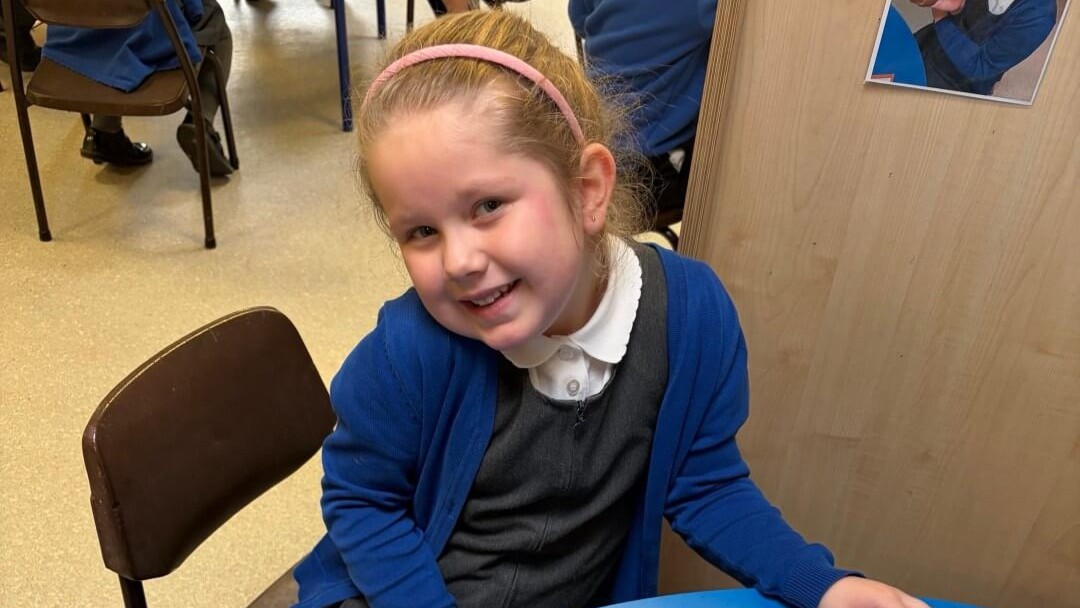
Recently, FS2 have been exploring number bonds to 5. The children have used five-frames and part-whole models to investigate these number bonds, and they have

This week, FS2 enjoyed a lovely Christingle service at St Mary’s Church, Catcliffe. They took part in a range of festive craft activities, joined in
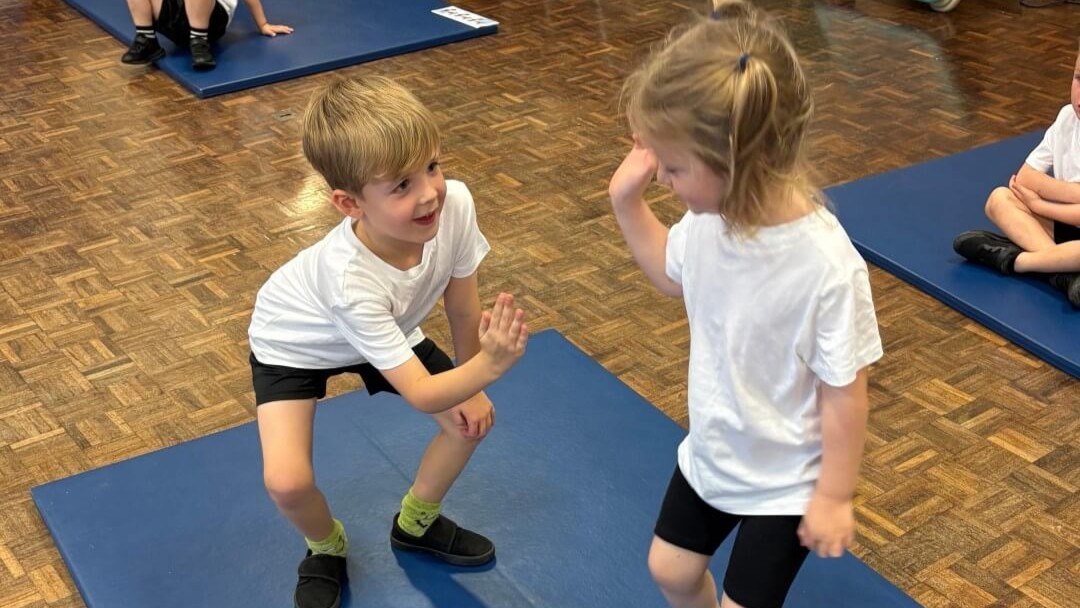
This week in PE, our Butterflies and Ladybirds built on their previous Maths learning about repeating patterns by taking it into the world of movement!

